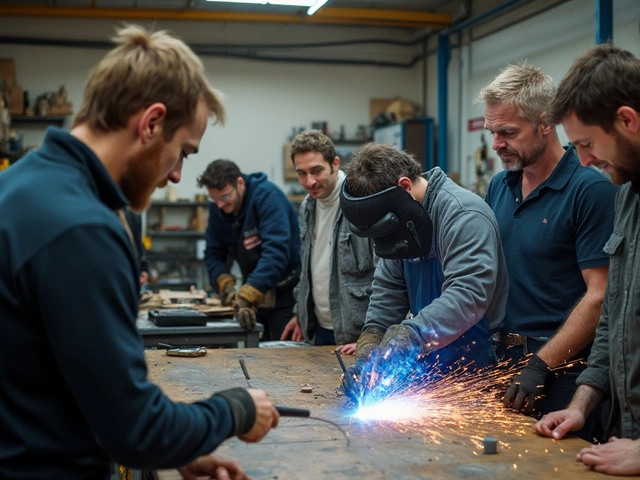Heard of NVQ and wondering if it opens doors in the USA? You’re not alone. NVQ stands for National Vocational Qualification. It’s a UK thing, and it’s honestly not something you’ll bump into at your local community college or on a US job application.
But here’s the twist: NVQs focus on proving you can actually do the job—real, hands-on stuff like plumbing, childcare, or hairdressing. In the UK, it’s well respected, practical, and can launch careers fast. So, what happens if you have one and you’re in the States, or you want a similar path here?
This article spills the truth about NVQs in America, breaks down why they haven’t taken hold, and points you to what the US offers instead. If you’re a Brit looking for work in the US, or you’re trying to pick a career route, stick around for real talk and some smart alternatives.
- What Is NVQ? Quick Breakdown
- Why the USA Doesn't Use NVQ Titles
- NVQ vs. US Career Credentials
- Getting US Recognition For NVQ Skills
- Tips for Choosing The Right Path
What Is NVQ? Quick Breakdown
Here’s the lowdown on NVQ. NVQ stands for National Vocational Qualification, a skills-based award launched in the UK in the late 1980s. It’s all about proving you can do specific jobs—not just talk about them in theory. Instead of cramming for big exams, you build up a portfolio showing your abilities are up to scratch for your industry.
You’ll usually find NVQ levels split like this:
- Level 1: Basic tasks at entry-level jobs (think basic food prep or simple construction work).
- Level 2: Building more competence—like an apprentice in hairdressing or electrical work.
- Level 3: Skilled and supervisory roles (managing people or running projects).
- Levels 4 and 5: Higher-level management or technical skills (think running entire departments).
The training happens on the job. You’ll get assessed by an expert who watches you at work and checks your portfolio. No big finals—just real evidence of what you can do.
For a quick look at how NVQ levels line up, here’s a table:
| NVQ Level | Type of Work | Typical Occupations |
|---|---|---|
| 1 | Basic tasks/support roles | Kitchen staff, warehouse assistant |
| 2 | Routine, specialised work | Hairdresser, electrical apprentice |
| 3 | Skilled, supervisory work | Team leader, assistant manager |
| 4-5 | Complex, management roles | Project manager, senior technician |
NVQs cover a laundry list of careers—childcare, plumbing, business admin, you name it. By focusing on skills you need at work, NVQ in USA searches show just how much people value proving they can actually do the job, not just study for it.
Why the USA Doesn't Use NVQ Titles
If you’ve looked for jobs in the USA, you know NVQ isn’t a term you ever see. That’s because the NVQ—short for NVQ in USA—is strictly a UK deal, made for the British education and employment system. The US has its own way of sorting out job skills, qualifications, and career benchmarks.
Here’s the main reason: education and career training in the States is run separately, by each state and local board. There’s no central body or national system like in the UK that approves qualifications for the whole country. So, a vocational qualification in Texas might look completely different from one in New York.
Instead of NVQs, the USA uses a patchwork of vocational schools, community colleges, and professional certifications. Licensing is also huge—think barber, electrician, nursing assistant—all often needing separate state licenses or certificates. Everything is tailored to local workforce needs and rules.
Want to see how different it gets? Check out this quick comparison:
| Feature | UK (NVQ System) | USA System |
|---|---|---|
| Standard Qualification | NVQ Level 1-5 | Diplomas, Certificates, Associate Degrees, State Licenses |
| Who Approves It? | Ofqual (national) | State agencies, industry groups, community colleges |
| Recognition Across Country? | Yes | Often No, varies state-to-state |
| Main Focus | Skills for a job, hands-on | Mix of theory, hands-on, sometimes general education |
So, if you bring an NVQ to the States, no big agency here automatically knows what it is or what level it equals. That’s why it’s not used in the everyday language of American jobs and schools. If you’re looking to transfer your skills, you’ll have to translate them and maybe even get local certifications.

NVQ vs. US Career Credentials
If you’re sizing up a NVQ in USA against what we’ve got here, there’s no apples-to-apples match. The US just doesn’t use that exact system. But we do have plenty of hands-on, skills-based routes — they just go by different names and rules.
Here’s how it shakes out: an NVQ proves you can handle a specific job, like auto technician or chef, by showing the skills on the job. In the US, we use certifications, state licenses, community college diplomas, and sometimes apprenticeships. These all vary by job type and state. For example, plumbers in the US usually need an apprenticeship and a license, not a national “qualification.”
- NVQ (UK): Levels 1-5, practical work proof, industry-recognized in the UK, no classroom exams.
- US credentials: Mostly state-based licenses, short certificates, workplace tests, sometimes even college degrees (think nursing or culinary arts).
If you’re hoping to use your NVQ in the US, here’s the kicker: American employers will ask for proof of skills, often via state or industry-specific tests. Sometimes, your NVQ helps, but most times you'll need to get certified the American way.
Check out this quick breakdown for a few in-demand roles:
| Job | UK Path (NVQ) | US Path |
|---|---|---|
| Electrician | NVQ Level 3 & Apprenticeship | State License & Apprenticeship |
| Healthcare Assistant | NVQ Level 2-3 in Health & Social Care | Certified Nursing Assistant (CNA) Course & State Exam |
| Chef | NVQ Level 2-3 in Professional Cookery | Associate Degree or Certificate in Culinary Arts |
| Childcare Worker | NVQ Level 2-3 in Childcare | Child Development Associate (CDA) Credential |
The real takeaway? Americans are big on industry certifications and passing tests. If you’ve got an NVQ, highlight your experience and be ready to complete extra steps to meet US rules. If you’re looking for something similar to an NVQ course in the States, check out cert programs at community colleges, trade unions, or online platforms. The path looks different but the goal—solid job skills—is the same on both sides of the pond.
Getting US Recognition For NVQ Skills
So, you’ve got an NVQ and you’re on US soil, crossing your fingers it’ll count for something. The bad news: the US doesn’t officially recognize NVQ certificates. The good news? All isn’t lost if you’ve got real skills and a track record.
The first move is to get your NVQ evaluated. Groups like World Education Services (WES) and Educational Credential Evaluators (ECE) translate international qualifications into something US schools or employers understand. They won’t magically turn an NVQ into a US diploma, but they might highlight what level you’ve reached—maybe it matches some college credits or a certificate program here.
For skilled trades, it’s not just about paperwork. Let’s say you’re a plumber, electrician, or have a trade under your belt—US states want you to prove your know-how. That usually means:
- NVQ in USA: You’ll likely be asked for proof of your training and on-the-job experience. The more detailed, the better.
- State licensing boards might let you skip some classroom time—but you’ll still need to pass local exams and background checks.
- If you’re in healthcare, areas like nursing or childcare have strict US rules. Often you’ll need extra training, but showing your NVQ record can help when applying for bridge programs.
If you’re job hunting, tailor your resume to match US terms. Employers want to know you can do the job, so show off practical achievements and get references lined up if possible.
Got heavy skills but no paper US version yet? Consider taking a trade test, going for a US-based industry certification, or checking if companies accept your experience for ‘advanced standing’ in training programs. Don’t expect your NVQ to get you a license instantly, but it can get your foot in the door.

Tips for Choosing The Right Path
When you’re weighing up career moves or thinking about following NVQ in USA alternatives, it’s easy to get lost in the weeds. The first thing is to get clear on your ultimate goal. Are you after better pay, job security, something hands-on, or just recognized credentials? Answer this honestly and it’ll save you a ton of time.
If you already have an NVQ or similar experience from abroad, look into how it slots into the US system. According to the U.S. Bureau of Labor Statistics, apprenticeships and certificates can boost earnings by as much as 35% compared to jobs that don’t require formal training. That’s a solid payout for proving your skills.
"There’s no single path in American careers—it’s all about matching your talents and experience to the right credentials," says Dr. Chloe Green, workforce development specialist at Penn State.
Here are steps to help keep things simple:
- Research your trade: Check job ads to see what US employers actually want. Search O*NET and LinkedIn for exact skills and required credentials.
- Check with credential evaluators: Services like WES (World Education Services) or NACES can review foreign NVQ qualifications to see if they count for anything official in the US. Not all credits transfer, but it’s worth a shot.
- Connect with US trade associations: Bodies like the National Center for Construction Education & Research (NCCER) or American Medical Technologists (AMT) can explain specific US routes and may even recognize some experience from your NVQ.
- Look into apprenticeships or certificates: Community colleges are goldmines for hands-on courses and fast-track programs. Many states have “workforce training” hubs that can help steer you toward the most respected certifications for your chosen job.
- Talk to people who’ve done it: Forums like Reddit’s r/SkilledTrades or Facebook groups for international workers in the US have loads of stories about what worked—and what was a waste of time.
Here’s a quick look at how long various US routes may take from zero to employable:
| US Credential | Typical Duration |
|---|---|
| Trade Certificate | 6-12 months |
| Associate Degree | 2 years |
| Apprenticeship | 1-4 years (paid, often no tuition) |
| Stackable Micro-credentials | Weeks to months |
Don’t fall for anyone promising an instant US license based on your NVQ—regulators are strict and shortcuts barely exist. Focus on combining your skills with the right US paperwork. And if in doubt, call your local community college or workforce board for free, legit advice. They talk to employers every day and know what actually gets folks hired.





Write a comment